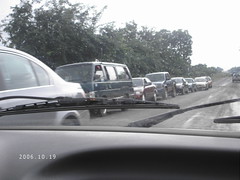In any event, I cannot help but wonder whether the load-shedding exercise is not one too many, having outlived its usefulness. First, the holiday of 23rd October was granted a load-management-free day by the government. Now, this: a good four or five days, where electricity won’t go off for 12 hours.
The mind boggles.
Suffice-to-say, uncharacteristically, there have been some positive developments lately than anticipated:
However – and in Ghana, there is always a challenge to grapple with – utility tariffs have gone up.
I cannot for the life of me understand the underpinning logic of the Public Utilities Regulatory Commission (PURC) Chairman, Mr.Pianim, claiming that “tariff adjustments will help ease the intense pressure on the national kitty.”
Check this: Pianim is Chairman of a regulatory utilities commission and he speaks like a free-market man, who believes that competition in the industry is the best way for Ghana’s water and electricity. Just because the government allowed themselves to be hood-winked by the over-balance of perceived "efficiency" of the private sector in water[Rand, water], he believes the same can be applied for electricity?
What type of vision is this by a CHAIRMAN of a utilities regulator?
Besides, the logic is flawed: multinational companies are more interested in the efficiency of service delivery than the raising of tariffs, for the sake of it. You can raise the rates all you want, yet when the capital—not to mention the country—experiences sporadic electricity supply as evidenced by my rant last week, when I opined last week that Accra is "in the dark ages", which company is going to be interested in investing in that sort of shoddy and egregious service?
My sentiments are further buttressed by the case of my surrogate home, Belgium, where the energy sector is about to be liberalized as of 1 January 2007. I sent a note to my colleagues about this development the other day:
Energie
Comparez les prix avant d’agir
Uccle
La ministre bruxelloise de
l’Energie, Evelyne Huytebroeck,
a invité les consommateurs
bruxellois à ne pas se précipiter
dans le choix de leur fournisseur
de gaz et d’électricité,
deux secteurs dont la libéralisation
interviendra, pour l’ensemble
des particuliers, le 1r janvier
prochain.
As liberalisation takes off 1 January 2007, the Minister of Energy has at least set the stage such that Belgians have a fair idea of what they are getting their heads into. Liberalization will enable them to choose a gas or electricity provider, and there is a website (http://www.brugel.be) which enables Belgians to choose provider.
There is even a free brochure being worked on and a free number for those who have queries…
Undoubtedly, not to forget countervailing measures and pressures against liberalization, our Ghanaian counterparts could learn some serious lessons from micromanaging an already-bad situation!
From: http://www.tbx.be/fr/07.02/Archives/app.rvb?date=2006-11-02
A family friend back in Belgium, whom I also copied this, wrote back saying that associated with this liberalization, will be the Suez-owned Electrabel, which is Belgium’s premier electricity provider, no longer providing the meters for the electricity reading, but it being delegated to "an independent meter reading company."
Furthermore, it transpired that one of the companies that are waiting to jump onto the liberalization bandwagon has said this:
“Alexander Dewulf, the CEO of the Belgium branch of Dutch multinational Nuon, says "we will not be present in Brussels because of risks relating to unpaid bills." (from: http://www.expatica.com/actual/article.asp?subchannel_id=48&story_id=33819)
All part of the juicy package of privatization.
Don’t you just love it when companies accentuate profit over the people?
I have a sneaky suspicion that what’s happening in Western Europe is bound to happen in even more pernicious ways in countries of Africa if they’re not mindful of the dogmatic and Pavlovian response to the posse that come with deregulation, privatization and liberalization, without adequate and sufficient regulation.
Suffice-to-say, though, that Belgium Energy Minister, Evelyne Huytebroeck (Greens), has mitigated things to the effect that she is emphatic about “not yield[ing] to pressure from the energy supply industry” (from: http://www.vrtnieuws.net/nieuwsnet_master/versie2/english/details/061019_energy/index.shtml
)
Her stance is this:
"We'll go ahead with the liberalisation of the energy market anyway. If the utility companies don't want to supply domestic customers they won't be able to carry on supplying firms. The licence to supply energy applies to both domestic and commercial customers"
tags
accra;ghana news;ghana belgium;
ghana energy;


No comments:
Post a Comment